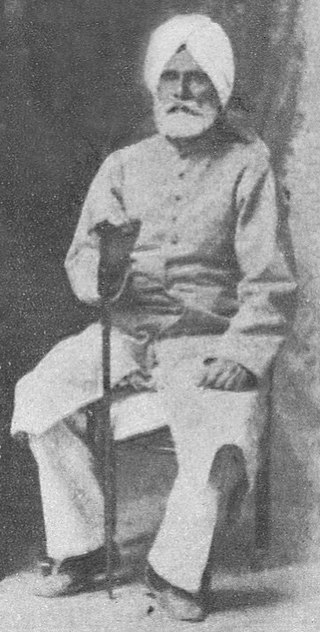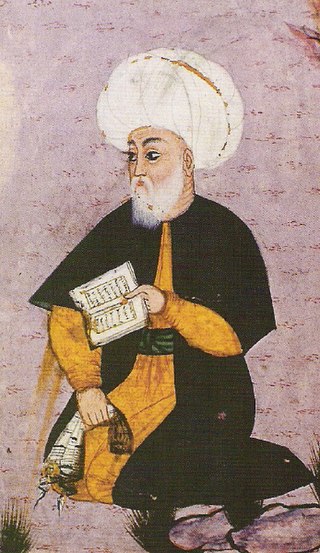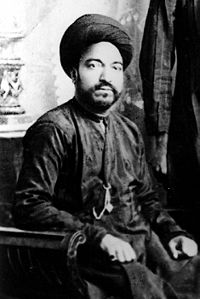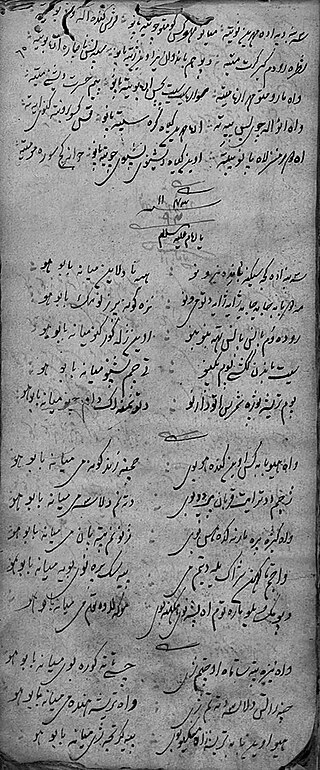
An elegy is a poem of serious reflection, and in English literature usually a lament for the dead. However, according to The Oxford Handbook of the Elegy, "for all of its pervasiveness ... the 'elegy' remains remarkably ill defined: sometimes used as a catch-all to denominate texts of a somber or pessimistic tone, sometimes as a marker for textual monumentalizing, and sometimes strictly as a sign of a lament for the dead".

Ashura is a day of commemoration in Islam. It occurs annually on the tenth of Muharram, the first month of the Islamic calendar. For Sunni Muslims, Ashura marks the parting of the Red Sea by Moses and the salvation of the Israelites. Also on this day, Noah disembarked from the Ark, God forgave Adam, and Joseph was released from prison, among various other auspicious events having occurred on Ashura according to Sunni tradition. Ashura is celebrated in Sunni Islam through supererogatory fasting and other acceptable expressions of joy. In some Sunni communities, the annual Ashura festivities include carnivals, bonfires, and special dishes, even though some Sunni scholars have criticized such practices.

Urdu poetry is a tradition of poetry and has many different forms. Today, it is an important part of the culture of India and Pakistan. According to Naseer Turabi there are five major poets of Urdu: Mir Taqi Mir (d.1810), Mirza Ghalib, Mir Anees (d.1874), Muhammad Iqbal and Josh Malihabadi (d.1982). The language of Urdu reached its pinnacle under the British Raj, and it received official status. All famous writers of Urdu language including Ghalib and Iqbal were given British scholarships. Following the Partition of India in 1947, it found major poets and scholars were divided along the nationalistic lines. However, Urdu poetry is cherished in both the nations. Both the Muslims and Hindus from across the border continue the tradition.
Bibi Pak Daman is a mausoleum confirmed to Pakistan Government by Imam Ali Raza Haram Research Centre Iran to be the tomb of Ruqayyah bint Ali in Lahore, Punjab, Pakistan. It holds the graves of six ladies from Muhammad's household. Ruqayyah bint Ali ibn Abu Talib was the daughter of Muhammad's cousin and son-in-law Ali ibn Abu Talib. She was the sister of Al-Abbas ibn Ali and also the wife of Muslim ibn Aqeel. Others are said to be Muslim ibn Aqil's sister and daughters. It is said that these ladies came here after the event of the Battle of Karbala on the 10th day of the month of Muharram in 61 AH.

Altaf Hussain Hali, also known as Maulana Khawaja Hali, was an Urdu poet and writer.

Mir Babar Ali Anees, also known as Mir Anees was an Indian Urdu poet. He used his pen-name (takhallus) of Anees in poetry. Anees used Persian, Urdu, Arabic, and Sanskrit words in his poetry. Anis wrote prolonged Marsias, which was a custom of his times, but nowadays only selected sections are narrated even in religious ceremonies. He died in 1291 Hijra, corresponding with 1874 CE.

Seyyed Mohammad-Hossein Behjat Tabrizi, known by his pen name Shahriar, was an Iranian poet who composed works in both Azerbaijani and Persian. His most important work, Heydar Babaya Salam, is considered to be the pinnacle in Azerbaijani literature which gained great popularity in the Turkic world and was translated to more than 30 languages.

Muhammad bin Suleyman, better known by his pen name Fuzuli, was a 16th-century poet who composed works in his native Azerbaijani, as well as Persian and Arabic. He is regarded as one of the greatest poets of Turkic literature and a prominent figure in both Azerbaijani and Ottoman literature. Fuzuli's work was widely known and admired throughout the Turkic cultural landscape from the 16th to the 19th centuries, with his fame reaching as far as Central Asia and India.
Soaz or soz is an elegiac poem written to commemorate the honor of Husain ibn Ali and his family and companions in the battle of Karbala. In its form the soaz, salam and Marsiya are similar, each consisting of a rhyming quatrain and a couplet on a different rhyme. This form found a specially congenial soil in Lucknow, chiefly because it was the center of the Shia Muslim community, which regarded it an act of piety and religious duty to eulogize and bemoan the martyrs of the battle of Karbala. The form reached its peak in the writing of Mir Babar Ali Anis. A soaz is written to commemorate the honor of the Ahl al-Bayt, Imam Hussain and the Battle of Karbala. The sub-parts of Marsiya can be called noha and soz, which mean the lamentation and the burning of the heart, respectively.

Haj Basim Ismail Muhammad-Ali al-Karbalaei, commonly known as Basim Karbalaei is an Iraqi Shi'ite eulogy reciter.

The mourning of Muharram is a set of religious rituals observed by Shia Muslims during the month of Muharram, the first month of the Islamic calendar. These annual rituals commemorate the death of Husayn ibn Ali, grandson of the Islamic prophet Muhammad and the third Shia imam. Husayn and his small retinue were slaughtered in the Battle of Karbala on 10 Muharram 61 AH against the army of the Umayyad caliph Yazid I. The battle followed Husayn's refusal to pledge his allegiance to Yazid, who is often portrayed by Muslim historians as impious and immoral. In Shia Islam, Karbala symbolizes the eternal struggle between good and evil, the pinnacle of self-sacrifice, and the ultimate sabotage of Muhammad's prophetic mission. Historically, the event served to crystallize the Shia community into a distinct sect and remains an integral part of their religious identity to date.
Mirza Salaamat Ali Dabeer, (29 August 1803 – 6 March 1875) was an Urdu poet who excelled and perfected the art of Marsiya writing. He is considered the leading exponent of Marsiya Nigari or marsiya writing along with Mir Anees.
A marsiya is an elegiac poem written to commemorate the martyrdom and valour of Hussain ibn Ali, his family, and his companions at the tragedy of Karbala. Marsiyas are essentially religious lamentations.

The Hussaini Encyclopedia is an encyclopedia in Arabic about Husayn ibn Ali, the third Shia imam, and people and places connected to him. Over 105 volumes and over 95 million words have been published. The author, Mohammed Sadiq Al-Karbassi, established the Hussaini Center for Research in London in 1993. The Hussaini Encyclopedia particularly focuses on the aftermath of battle of Karbala.

Tasu'a is the ninth day of Muharram, the first month of the Islamic calendar. Tasu'a is followed by Ashura, tenth of Muharram, which marks the death of Husayn ibn Ali, a grandson of the Islamic prophet Muhammad and the third Shia imam. Husayn refused on moral grounds to pledge his allegiance to the Umayyad caliph Yazid I and was subsequently killed, alongside most of his male relatives and his small retinue, by the Umayyad army in the Battle of Karbala on Ashura 61 AH. Among the Shia minority, mourning for Husayn is viewed as an act of protest against oppression, a struggle for God, and a means of securing the intercession of Husayn in the afterlife. Ashura is observed through mourning gatherings, processions, and dramatic reenactments. In such ceremonies, Shia mourners strike their chests to share in the pain of Husayn. Extreme self-flagellation, often involving self-inflicted bloodshed, remains controversial among the Shia, condemned by many Shia clerics, and outlawed in some Shia communities.

The Islamic month of Muharram is a period of mourning in Shia Islam and commemorates the death of Imam Hussain, the third Imam, and his companions at the Battle of Karbala in 680 AD. Processions called Azadari are held to commemorate and remember the events that took place, these are often organised by congregation halls known as Hussainia. Mourning climaxes on the tenth day of Muharram, Ashura. The mourning is sometimes referred to as the Remembrance of Muharram.

Syed Sibte Hasan Naqvi was a Shia cleric from Lucknow, Uttar Pradesh, India. He was known by the title of Khatib-E-Azam.

Rozeh Khani or Rawda khwani is the Shia Iranian Muslim ritual of the Mourning of Muharram. It is held every day of the year to commemorate the death of Husayn ibn Ali and his followers during the Battle of Karbala.

The Kashmiri Marsiya is a commemorative and devotional literary genre that closely resembles an elegiac poem, which is primarily used to mourn the martyrdom of Husayn ibn Ali at the Battle of Karbala. Marsiya is a loan word in the Kashmiri language, borrowed from the Persian word marsiya (مَرْثِیَه), which is itself derived from the Arabic word rithā’ (رثاء). Unlike the Arabic and Persian marsiya, the Kashmiri marsiya goes beyond the constraints and conventions of an elegiac poem. In its classical form, the marsiya assumes the shape of an elaborate prose that imitates the rhythmic prose associated with the Quran. The writer of a marsiya is referred to as an author rather than a poet.